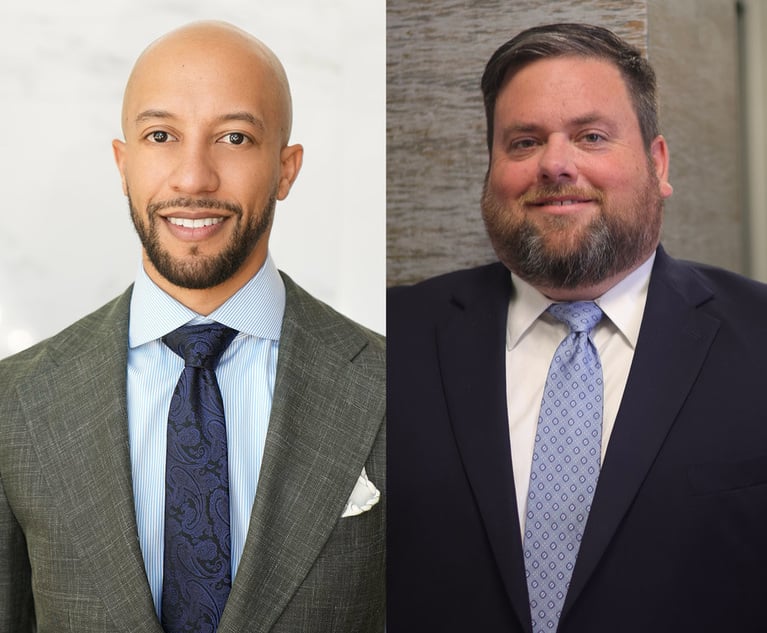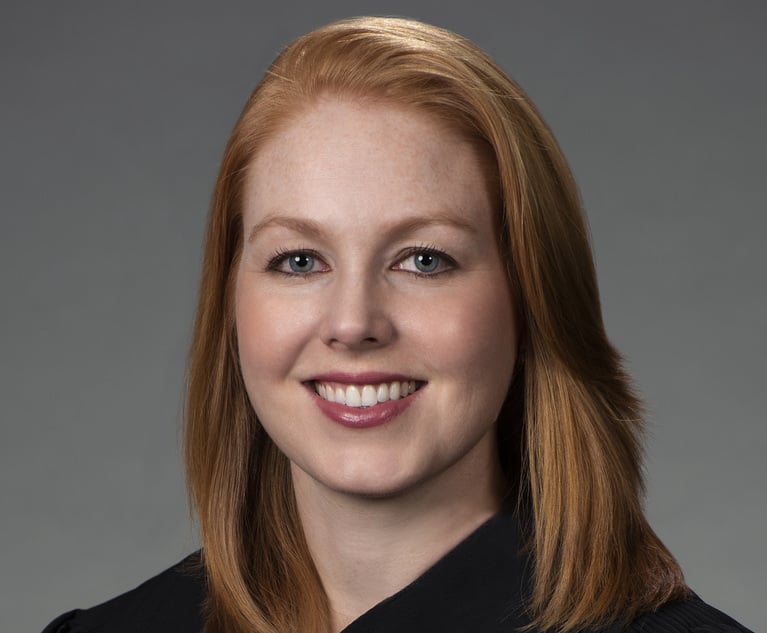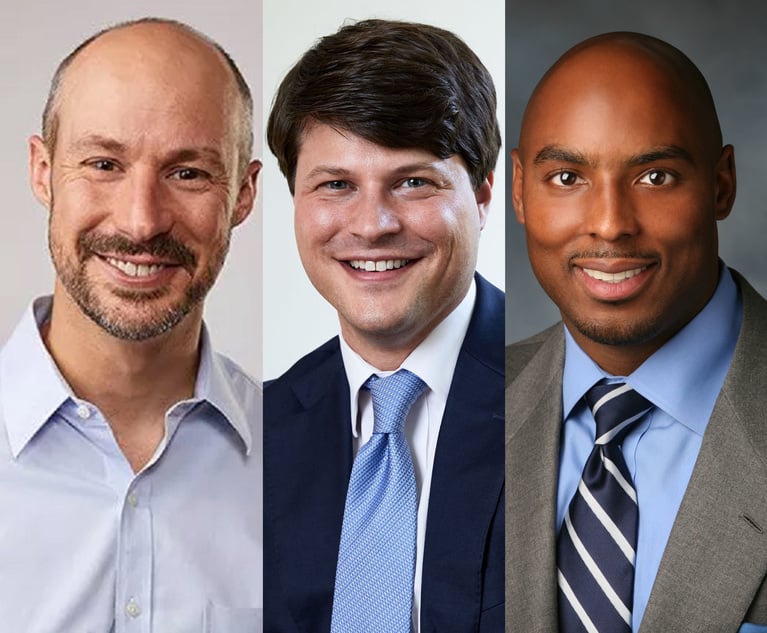In Georgia Case, High Court Holds LGBT Employees Are Protected by Sex Discrimination Law
The decision stems from Clayton County's firing of Gerald Bostock as a child welfare services coordinator, which he said was based on his supervisors' discovery that he was gay. The U.S. Court of Appeals for the Eleventh Circuit had applied its 39-year-old precedent holding "discharge for homosexuality is not prohibited by Title VII."
June 15, 2020 at 10:36 AM
5 minute read
The original version of this story was published on National Law Journal
 Justice Neil Gorsuch (Photo: Diego M. Radzinschi / ALM)
Justice Neil Gorsuch (Photo: Diego M. Radzinschi / ALM)
The U.S. Supreme Court in a divided decision Monday said federal workplace laws prohibit employers from firing gay, lesbian and transgender workers.
The justices split 6-3, with Justice Neil Gorsuch writing the majority opinion. He was joined by Chief Justice John Roberts Jr., and the court's liberal wing. Justices Brett Kavanaugh and Samuel Alito Jr. wrote separate dissents. Justice Clarence Thomas joined Alito's dissent.
"Those who adopted the Civil Rights Act might not have anticipated their work would lead to this particular result. Likely, they weren't thinking about many of the Act's consequences that have become apparent over the years, including its prohibition against discrimination on the basis of motherhood or its ban on the sexual harassment of male employees," Gorsuch wrote in his 43-page opinion. "But the limits of the drafters' imagination supply no reason to ignore the law's demands. When the express terms of a statute give us one answer and extratextual considerations suggest another, it's no contest. Only the written word is the law, and all persons are entitled to its benefit."
At oral argument, Gorsuch was seen as possibly leaning toward a ruling for broad protections for LGBT workers based on the text of the law. But he also expressed concern about the possible social impact of providing Title VII coverage.
Alito stated in his 54-page dissent: "There is only one word for what the court has done today: legislation. The document that the Court releases is in the form of a judicial opinion interpreting a statute, but that is deceptive."
Alto noted that numerous bills have been introduced over the past 45 years that would specifically add "sexual orientation" and "gender identity" to protections under Title VII. "But to date, none has passed both Houses," he wrote.
Kavanaugh, in his separate dissent, wrote that the policy arguments for applying Title VII coverage were "weighty," but, he added, "we are judges, not Members of Congress. Our role is not to make or amend the law. As written, Title VII does not prohibit employment discrimination because of sexual orientation." That analysis applies as well to whether Title VII covers gender identity discrimination, he wrote.
The court's decision came in three cases which focused closely on the text of Title VII of the Civil Rights Act of 1964 which bars discrimination by employers "because of … sex." Two cases—Bostock v. Clayton County, Georgia, and Altitude Express v. Zarda—raised the question of sexual orientation under Title VII. R.G. and G.R. Harris Funeral Homes v. EEOC and Stephens centered on gender identity.
Gerald Bostock blamed his firing as a child welfare services coordinator on Clayton County's discovery that he was gay. The U.S. Court of Appeals for the Eleventh Circuit applied its 39-year-old precedent holding "discharge for homosexuality is not prohibited by Title VII."
The Eleventh Circuit refused to review the panel decision. Circuit Judge Robin Rosenbaum filed a dissent on the issue of reconsideration, calling the case "indisputably en-banc-worthy" and noting action by other circuits.
Brian Sutherland of Atlanta's Buckley Beal was counsel to Bostock; Clayton County was represented by Jack Hancock of Freeman Mathis & Gary. Both lawyers remained on the case at the U.S. high court, although oral arguments were handled by other lawyers.
During arguments in October in Bostock and Zarda, Stanford Law's Pamela Karlan, representing gay and lesbian employees, told the justices: "When an employer fires a male employee for dating men but does not fire female employees who date men, he violates Title VII. The employer has, in the words of Section 703(a), discriminated against the man because he treats that man worse than women who want to do the same thing. And that discrimination is because of sex because the adverse employment action is based on the male employee's failure to conform to a particular expectation about how men should behave."
But Alito noted that Congress has repeatedly declined to act on requests to address the sexual orientation issue. "And if the court takes this up and interprets this 1964 statute to prohibit discrimination based on sexual orientation, we will be acting exactly like a legislature," he said.
Karlan's opponents, Jeffrey Harris of the boutique firm Consovoy Park and U.S. Solicitor General Noel Francisco, argued that the sexual orientation and gender identity issues should be decided by Congress, not the high court. The EEOC, which has pushed for a broad reading of Title VII, did not join the Justice Department's brief in the Supreme Court.
At the hearing, Justice Sonia Sotomayor countered that the original Congress used very clear words about what the statute meant. "And regardless of what others may have thought over time, it's very clear that what's happening fits those words. At what point do we say we have to step in?"
Daily Report managing editor Jonathan Ringel (@jonathanringel) added local information to this article, which first ran in the National Law Journal.
This content has been archived. It is available through our partners, LexisNexis® and Bloomberg Law.
To view this content, please continue to their sites.
Not a Lexis Subscriber?
Subscribe Now
Not a Bloomberg Law Subscriber?
Subscribe Now
NOT FOR REPRINT
© 2025 ALM Global, LLC, All Rights Reserved. Request academic re-use from www.copyright.com. All other uses, submit a request to [email protected]. For more information visit Asset & Logo Licensing.
You Might Like
View All
Trial Court Had No Authority to Reopen Voir Dire After Jury Impaneled in Civil Case, State Appellate Court Rules

'Pushed Into Oncoming Traffic': $5.85M Settlement in Mediated Auto Tort
6 minute read
Justice Known for Asking 'Tough Questions' Resolves to Improve Civility
4 minute read
Law Firms Mentioned
Trending Stories
- 1Relaxing Penalties on Discovery Noncompliance Allows Criminal Cases to Get Decided on Merit
- 2Reviewing Judge Merchan's Unconditional Discharge
- 3With New Civil Jury Selection Rule, Litigants Should Carefully Weigh Waiver Risks
- 4Young Lawyers Become Old(er) Lawyers
- 5Caught In the In Between: A Legal Roadmap for the Sandwich Generation
Who Got The Work
J. Brugh Lower of Gibbons has entered an appearance for industrial equipment supplier Devco Corporation in a pending trademark infringement lawsuit. The suit, accusing the defendant of selling knock-off Graco products, was filed Dec. 18 in New Jersey District Court by Rivkin Radler on behalf of Graco Inc. and Graco Minnesota. The case, assigned to U.S. District Judge Zahid N. Quraishi, is 3:24-cv-11294, Graco Inc. et al v. Devco Corporation.
Who Got The Work
Rebecca Maller-Stein and Kent A. Yalowitz of Arnold & Porter Kaye Scholer have entered their appearances for Hanaco Venture Capital and its executives, Lior Prosor and David Frankel, in a pending securities lawsuit. The action, filed on Dec. 24 in New York Southern District Court by Zell, Aron & Co. on behalf of Goldeneye Advisors, accuses the defendants of negligently and fraudulently managing the plaintiff's $1 million investment. The case, assigned to U.S. District Judge Vernon S. Broderick, is 1:24-cv-09918, Goldeneye Advisors, LLC v. Hanaco Venture Capital, Ltd. et al.
Who Got The Work
Attorneys from A&O Shearman has stepped in as defense counsel for Toronto-Dominion Bank and other defendants in a pending securities class action. The suit, filed Dec. 11 in New York Southern District Court by Bleichmar Fonti & Auld, accuses the defendants of concealing the bank's 'pervasive' deficiencies in regards to its compliance with the Bank Secrecy Act and the quality of its anti-money laundering controls. The case, assigned to U.S. District Judge Arun Subramanian, is 1:24-cv-09445, Gonzalez v. The Toronto-Dominion Bank et al.
Who Got The Work
Crown Castle International, a Pennsylvania company providing shared communications infrastructure, has turned to Luke D. Wolf of Gordon Rees Scully Mansukhani to fend off a pending breach-of-contract lawsuit. The court action, filed Nov. 25 in Michigan Eastern District Court by Hooper Hathaway PC on behalf of The Town Residences LLC, accuses Crown Castle of failing to transfer approximately $30,000 in utility payments from T-Mobile in breach of a roof-top lease and assignment agreement. The case, assigned to U.S. District Judge Susan K. Declercq, is 2:24-cv-13131, The Town Residences LLC v. T-Mobile US, Inc. et al.
Who Got The Work
Wilfred P. Coronato and Daniel M. Schwartz of McCarter & English have stepped in as defense counsel to Electrolux Home Products Inc. in a pending product liability lawsuit. The court action, filed Nov. 26 in New York Eastern District Court by Poulos Lopiccolo PC and Nagel Rice LLP on behalf of David Stern, alleges that the defendant's refrigerators’ drawers and shelving repeatedly break and fall apart within months after purchase. The case, assigned to U.S. District Judge Joan M. Azrack, is 2:24-cv-08204, Stern v. Electrolux Home Products, Inc.
Featured Firms
Law Offices of Gary Martin Hays & Associates, P.C.
(470) 294-1674
Law Offices of Mark E. Salomone
(857) 444-6468
Smith & Hassler
(713) 739-1250






